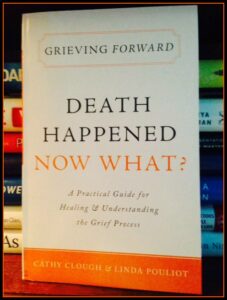
Why Is Telling Your Story Important?
Why is telling your story important? Because sharing stories is how healing happens. Grief pain is released with each word that we speak. And when we listen as other’s share their stories of loss, we realize that we are not alone. Additionally, when we listen to someone who shares a similar experience, we discover that what we are thinking and feeling is normal for grief – and knowing what is normal for grief helps to normalize our grief response.
Our Ears Need to Hear Our Story
Our ears need to hear the words of our story of loss in our own voice, over and over again, so that our mind, brain and heart can begin the process of sorting out and processing not only what has happened to our loved one, but what has happened to us. And we need to hear it with our own ears to believe it. There is a lot to sort out too. You have moved from having a physical relationship with your loved one to one of memory. And your brain and heart are in the process of rewiring to a new environment which no longer includes your loved one. This is challenging and exhausting.
What About Writing for Healing?
Pouring out feelings on paper supports the healing process too. However, only focusing on the pain and sadness, entry after entry, can keep us stuck in pain and sadness and can make us feel worse. This is what happened to me. In fact, I stopped writing about my feelings and all things involved with the death because I felt so much worse after writing. Until I learned the following.
How To Do It
The recommendation is to keep your writing sessions to approximately twenty minutes. Additionally, inject positive words in your writing. For example: Love. Joy. Peace. Caring. Strong. Determined. Proud… This can be difficult to do but it is possible.
Day One: Write your story. Include all the raw emotions that you are experiencing and anything else that you need to write about. Don’t hold back.
Day Two: Write your story again. Include the raw feelings… However, this time include what you are grateful for and what you are learning.
Day Three: Write your story again. Include the raw emotions and anything else that is painful or driving you nuts. Once again include what you are grateful for and what you are learning. Then push yourself forward along your healing journey by writing down two new short-term goals and to new long-term goals. Keep in mind too that goals are not set in cement. It’s okay to change them as needed. Dream a little too. Do you want to take class? Paint a room? Find employment or change employment? Book a trip? Clean your house? And note why each goal is important to you.
Repeat As Many Times as You Want
You can do this as many times as you want to and over any time period. However, if you don’t want anyone to ever see what you have written you have options. For example, lock your computer. Or store your journal in a safe. And the most shared solution over the years in grief support groups is to write your words down and then burn the paper. However, the recommendation is to burn your paper in a firepit outside. Not in a garbage can or a dish in your office. I have a friend you started her home office on fire because she used the wastepaper basket next to her desk. The fire department was needed. Of course, this happened when her teenagers were getting home from school… more explaining to do. Not funny then but funny now because no one was hurt. Burning is the favorite for many of us because there is something empowering and healing as we watch the fire consume our words and as we feel the pain go up in smoke.
Tell Your Story to Anyone Who Will Listen
The good news is that early in grief people expect you to tell your story and they listen – sometimes even when they don’t want to listen. I told everyone everywhere I went. The bank teller, the grocery store clerk, the mailman… I didn’t even care when people didn’t know how to respond to my sad news. However, I did restrain myself while shopping at Meijer a few days after the funeral from yelling, “Everyone stop. My husband is dead! How can you guys act as if nothing has happened?” Even today when I am out shopping, I look around at all the people in the store and I know that someone in the crowd is grieving and wanting to yell the same thing. When we listen to others, we help them to heal too. A good grief support group is a great place to share your story and to be heard – and to listen to others and help them to heal.
We wrote Grieving Forward: Death Happened, Now What? just for you. Because we don’t want you to have to figure out and learn thing the hard way like we did.
The writing exercise is based on the work of James W. Pennebaker, PhD
Learn more about writing in his books, Expressive Writing, Words That Heal and Open Up By Writing Down

